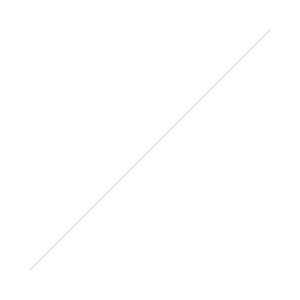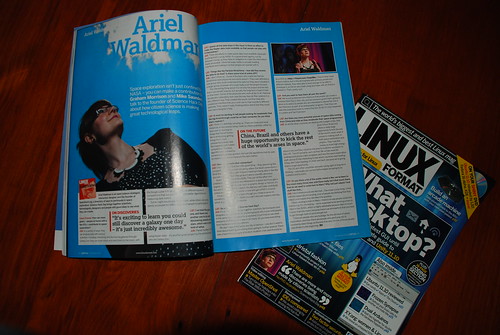 Okay, I'm not precisely the hot centerfold spread (that was saved for a revealing penguin shot), but I was put on the cover of Linux Format! I tried to talk the interviewers into making the cover a picture of Tux in an astronaut suit (like GitHub's octonaut) - sadly this didn't come to fruition.Here's the PDF of the article, or you can go buy the full magazine here.A quick correction in the article that I alerted the writers about: Jeremy Keith is the original founder of Science Hack Day in London - I founded the second Science Hack Day in SF (which I should probably write a blog post about) and am leading up the charge in helping others create Science Hack Days around the world.
Okay, I'm not precisely the hot centerfold spread (that was saved for a revealing penguin shot), but I was put on the cover of Linux Format! I tried to talk the interviewers into making the cover a picture of Tux in an astronaut suit (like GitHub's octonaut) - sadly this didn't come to fruition.Here's the PDF of the article, or you can go buy the full magazine here.A quick correction in the article that I alerted the writers about: Jeremy Keith is the original founder of Science Hack Day in London - I founded the second Science Hack Day in SF (which I should probably write a blog post about) and am leading up the charge in helping others create Science Hack Days around the world.
Mail delivery from NASA
I just received the most awesome thing in the mail from NASA: a block of aerogel incased in one of the original boxes (see the inscribed number on the box) that held a block of aerogel for NASA's Stardust spacecraft. Aerogel was used in the spacecraft to capture pieces of interstellar dust by impacting a comet. As you can tell from the photographs below, aerogel is not very easy to photograph: it's the lightest solid on Earth: 99.8% of it is made of air. It's also like fiberglass, hence I used plastic wrap to handle it carefully.Jealous? There's actually a way for you to look at pieces of interstellar dust in blocks of aerogel while helping further scientific discoveries at the same time! Stardust@home is a project where anyone can go and collaborate with scientists to find pieces of interstellar dust in images of aerogel - there's simply so much aerogel to go through that it's more than any one person could do in a lifetime. So, I recommend signing up!Update: apparently there's also open source ways to create your own aerogel (though, the materials can be dangerous/cancerous, so please be careful).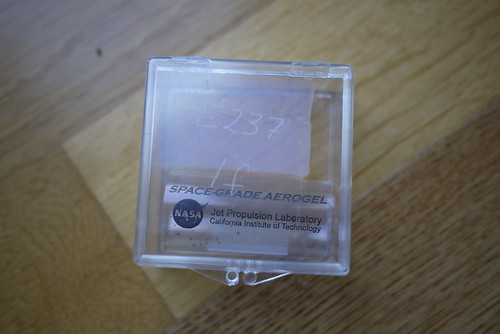
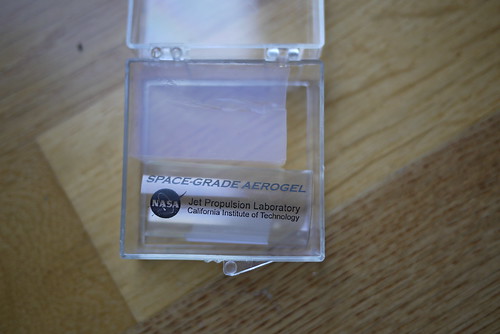
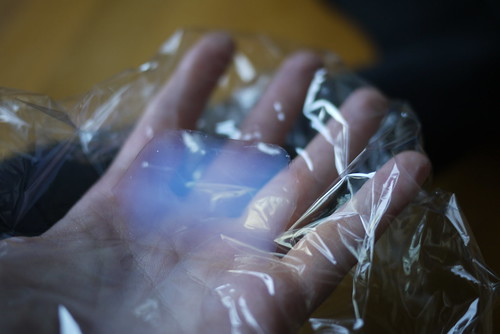
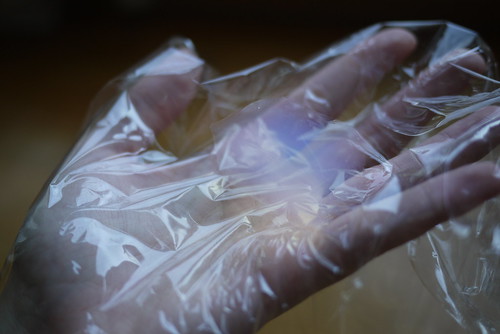
Hacking science: the intersection of web geeks and science geeks
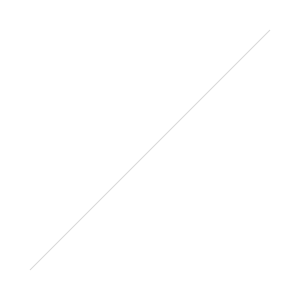 I was honored to be an invited guest blogger on Scientific American - I'm reblogging my article here:Science should be something that is disruptively accessible – empowering people from a variety of different backgrounds to explore, participate in, and build new ways of interacting with and contributing to science. Unfortunately, the relationship most adults have with scientific exploration is one of observation: usually watching government agencies and scientists explore on behalf of us, but not actually exploring it ourselves.There has been a considerable movement in the last few years to make science more open between scientific disciplines and to the perceived “public”. But simply making science open – by placing datasets, research, and materials online and using open source licensing – is only half the battle. Open is not the same as accessible. Often the materials are very cryptic or are buried deep within a government website where they’re not easy to find.You only need to look at projects like Galaxy Zoo to understand the importance of making science accessible. The Sloan Digital Sky Survey had opened up their data, but it wasn’t until the group behind Galaxy Zoo created a thoughtful interface for it that it truly became accessible for hundreds of thousands of people to interact with it and actively contribute to scientific discovery through it. So how can we continue to make science more disruptively accessible across all science disciplines, geographies, industries and skill-sets?Enter Science Hack Day, a 48-hour-all-night event that brings together designers, developers, scientists and other enthusiastic geeks in the same physical space for a brief but intense period of collaboration, hacking, and building ‘cool stuff’. A hack is a unique modification, an interesting mashup or a quick solution to a problem – maybe not the most elegant solution, but often the cleverest. By having a fresh set of eyes from those who solve different types of problems across a variety of industries inside and outside of science, new concepts often emerge and can go on to influence science and adults’ relationship to science in unexpected ways.The first Science Hack Day was organized in London last year by web geek extraordinaire, Jeremy Keith. He set the mission of Science Hack Day to “Get excited and make things with science!“. Since then, web geeks and science geeks have been teaming up to build unique things with science – from a desk lamp that lights up every time an asteroid flies by the Earth to an augmented super collider diagnostic tool that let’s you listen to the sounds of particle collisions.Science Hack Days are being planned in cities around the world and you can begin organizing one, too, thanks to an open source set of instructions and a grant from the Alfred P. Sloan Foundation that will fund 10 people from around the world interested in organizing a Science Hack Day to attend the upcoming San Francisco event this November 12-13. If you think you might be interested in creating a Science Hack Day in your town, the application deadline for the funded trip to Science Hack Day San Francisco has been extended to September 2, so hurry!Through hacking, anyone can actively contribute to science, and often in surprising new ways.
I was honored to be an invited guest blogger on Scientific American - I'm reblogging my article here:Science should be something that is disruptively accessible – empowering people from a variety of different backgrounds to explore, participate in, and build new ways of interacting with and contributing to science. Unfortunately, the relationship most adults have with scientific exploration is one of observation: usually watching government agencies and scientists explore on behalf of us, but not actually exploring it ourselves.There has been a considerable movement in the last few years to make science more open between scientific disciplines and to the perceived “public”. But simply making science open – by placing datasets, research, and materials online and using open source licensing – is only half the battle. Open is not the same as accessible. Often the materials are very cryptic or are buried deep within a government website where they’re not easy to find.You only need to look at projects like Galaxy Zoo to understand the importance of making science accessible. The Sloan Digital Sky Survey had opened up their data, but it wasn’t until the group behind Galaxy Zoo created a thoughtful interface for it that it truly became accessible for hundreds of thousands of people to interact with it and actively contribute to scientific discovery through it. So how can we continue to make science more disruptively accessible across all science disciplines, geographies, industries and skill-sets?Enter Science Hack Day, a 48-hour-all-night event that brings together designers, developers, scientists and other enthusiastic geeks in the same physical space for a brief but intense period of collaboration, hacking, and building ‘cool stuff’. A hack is a unique modification, an interesting mashup or a quick solution to a problem – maybe not the most elegant solution, but often the cleverest. By having a fresh set of eyes from those who solve different types of problems across a variety of industries inside and outside of science, new concepts often emerge and can go on to influence science and adults’ relationship to science in unexpected ways.The first Science Hack Day was organized in London last year by web geek extraordinaire, Jeremy Keith. He set the mission of Science Hack Day to “Get excited and make things with science!“. Since then, web geeks and science geeks have been teaming up to build unique things with science – from a desk lamp that lights up every time an asteroid flies by the Earth to an augmented super collider diagnostic tool that let’s you listen to the sounds of particle collisions.Science Hack Days are being planned in cities around the world and you can begin organizing one, too, thanks to an open source set of instructions and a grant from the Alfred P. Sloan Foundation that will fund 10 people from around the world interested in organizing a Science Hack Day to attend the upcoming San Francisco event this November 12-13. If you think you might be interested in creating a Science Hack Day in your town, the application deadline for the funded trip to Science Hack Day San Francisco has been extended to September 2, so hurry!Through hacking, anyone can actively contribute to science, and often in surprising new ways.
5 years ago
 (Thanks to @magnuson for the original tweet)#5yearsagoThis is actually something I think about fairly often. When I give talks, I often mention where I came from, not only to illustrate that anyone can actively contribute to space exploration and scientific discovery, but also in hopes of finding other stories like mine. Stories about being overwhelmingly infatuated by communities of makers and changing your life/location to simply be surrounded by it. As a result, my life and the forces that drive me have radically changed over the course of 5 years, and more often than not, I seem to cross milestones the months of July/August.I thought I'd briefly share where I was in each of the last 5 years in the months of July/August, in hopes of reading yours as well:5 years ago, it was August 2006, I was working at a creative interactive agency in Kansas City, VML, that had been my dream job since the time I was 14. Despite being aware of just how late to the game I was when it came to blogging, I started my first blog, Shake Well Before Use, about the hybrids of art, advertising, sex + technology.4 years ago in August, I took what I still consider to be the biggest leap of faith in my life - I left my job of 8 years and moved to San Francisco without another job lined up. The first "gig" I got was working at a new startup called Pownce, where I met Leah Culver, Kevin Rose, and Daniel Burka for the first time (all of whom greatly inspired me with just how much a tiny team could build). There were many reasons I chose SF, but a large influence had been meeting so many amazing people at SXSW 2007 who *made* all the things I usually just blogged about.3 years ago in July/August, I was watching a documentary called When We Left Earth. I found it so inspiring that I took a shot in the dark and emailed NASA about wanting to work for them. Serendipitously, a job description had been crafted that very day that eerily read like my resume. I got the job. It changed my life forever.2 years ago in July, I attended Sci Foo, an unconference of ~200 world renowned scientists, after receiving a highly coveted invite from the O'Reilly team. As an un-scientist I was a bit terrified, to be honest. But I survived and it drove me to speak out more publicly.1 year ago in July, I rounded up 15 of the awesome friends and acquaintances I had made over the previous 4 years and we collectively started planning Science Hack Day San Francisco. Though the event didn't take place in July/August, looking back, I think putting it together is one of the best decisions I've ever made. Science Hack Day is just awesome.Today, I'm writing while on "half-vacation". Half-vacation because in July/August of this year, I learned that the first grant proposal I had written had been awarded. Like working for NASA, I don't think I had envisioned writing a grant proposal in my life. So, very happily, I'm now burning the midnight oil in Berlin, Paris and now Málaga, alongside the most lovely and awesome person (he came along ~2 years ago, but not in July/August). And yeah, it freaks me out to think where I was 5 years ago.
(Thanks to @magnuson for the original tweet)#5yearsagoThis is actually something I think about fairly often. When I give talks, I often mention where I came from, not only to illustrate that anyone can actively contribute to space exploration and scientific discovery, but also in hopes of finding other stories like mine. Stories about being overwhelmingly infatuated by communities of makers and changing your life/location to simply be surrounded by it. As a result, my life and the forces that drive me have radically changed over the course of 5 years, and more often than not, I seem to cross milestones the months of July/August.I thought I'd briefly share where I was in each of the last 5 years in the months of July/August, in hopes of reading yours as well:5 years ago, it was August 2006, I was working at a creative interactive agency in Kansas City, VML, that had been my dream job since the time I was 14. Despite being aware of just how late to the game I was when it came to blogging, I started my first blog, Shake Well Before Use, about the hybrids of art, advertising, sex + technology.4 years ago in August, I took what I still consider to be the biggest leap of faith in my life - I left my job of 8 years and moved to San Francisco without another job lined up. The first "gig" I got was working at a new startup called Pownce, where I met Leah Culver, Kevin Rose, and Daniel Burka for the first time (all of whom greatly inspired me with just how much a tiny team could build). There were many reasons I chose SF, but a large influence had been meeting so many amazing people at SXSW 2007 who *made* all the things I usually just blogged about.3 years ago in July/August, I was watching a documentary called When We Left Earth. I found it so inspiring that I took a shot in the dark and emailed NASA about wanting to work for them. Serendipitously, a job description had been crafted that very day that eerily read like my resume. I got the job. It changed my life forever.2 years ago in July, I attended Sci Foo, an unconference of ~200 world renowned scientists, after receiving a highly coveted invite from the O'Reilly team. As an un-scientist I was a bit terrified, to be honest. But I survived and it drove me to speak out more publicly.1 year ago in July, I rounded up 15 of the awesome friends and acquaintances I had made over the previous 4 years and we collectively started planning Science Hack Day San Francisco. Though the event didn't take place in July/August, looking back, I think putting it together is one of the best decisions I've ever made. Science Hack Day is just awesome.Today, I'm writing while on "half-vacation". Half-vacation because in July/August of this year, I learned that the first grant proposal I had written had been awarded. Like working for NASA, I don't think I had envisioned writing a grant proposal in my life. So, very happily, I'm now burning the midnight oil in Berlin, Paris and now Málaga, alongside the most lovely and awesome person (he came along ~2 years ago, but not in July/August). And yeah, it freaks me out to think where I was 5 years ago.
OSCON Keynote
Recently, I had the pleasure of keynoting at OSCON, O'Reilly Media's open source convention, on how people are creating open source space exploration and hacking science:
http://youtu.be/MZXmIkwQbjQ

